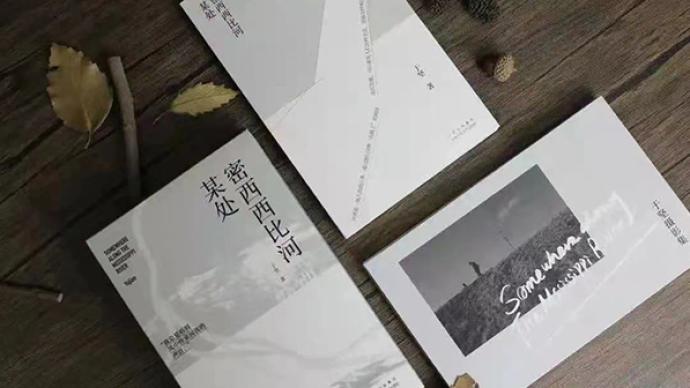
"Somewhere in the Mississippi" is the poet Yu Jian's latest long essay and his first collection of photographs.
As the title suggests, this is a "scenario writing" about the passage of the Mississippi River. Yu Jian writes about the natural scenery, the endless storm-like trees on the banks of the Mississippi River, and the dim, like a The river of Indian faces, the emotions and feelings experienced personally somewhere in the Mississipa will always hook up a distant memory, or a kind of poetry, and flow freely through various time and space, like babbling. Text across various genres.
At the same time, Yu Jian pays more attention to the civilization watered and grown by the river that makes the United States become the United States. The author believes that "many designs in the United States were originally local designs, but eventually became a universal design." How should we understand The American culture that finally prevailed in the world? What is it like in the context in which it is produced? From American fever to the shattering of the American dream, how should the narrative of America proceed?
Yu Jian wrote: "Rembrandt is definitely a lonely outdated old monster in New York. Coca-Cola is full of poetry, cars are full of poetry, computers are full of poetry, toilets are full of poetry, skyscrapers are full of poetry, glass, cement, steel are full of poetry, capital, The white cuffs of technology and business giants with their badges are full of poetry. Poetry is no longer the set of Whitman and Dickinson, not the starry sky, wilderness, blades of grass, forest, sunset, fireflies, moonlight... you You have to live here, on this artificial earth, to live a moist country. Accept your fate, this is your paradise, paradise is not in the afterlife, but in New York." In "Somewhere in the Mississippi River", Yu Jian wrote with a kind of presence and sincerity It leaves words and images for the United States at the moment, and at the same time reflects on the United States in the textual sense.
Regarding the writing of "Somewhere in the Mississippi", Yu Jian responded: "This book started about ten years ago, I completed the first part, and I have been looking for a direction since then. Intermittently, sometimes writing a poem, sometimes writing a paragraph Memories, sometimes a reflection, a note. I don’t want readers to think this is just another American travelogue—it’s a trendy subject. I was inspired by Kafka’s America, which was really just a kind of Kafka's 'American mood' collection of words has nothing to do with America, and he has never been to America."
Recently, The Paper interviewed Yu Jian.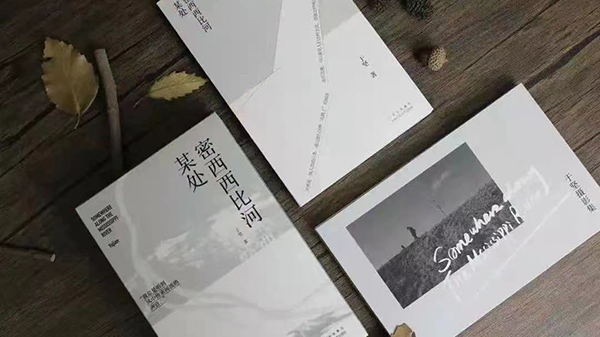
The Paper: How do you define the book "Somewhere in the Mississippi"? It looks like a travel journal, and also like a "picture description" of photographic works, and there are also many comments on poets and painters scattered in it?
Yu Jian: This book may be called a "phenomenological" writing. Phenomenon, "that which manifests itself in itself" (Heidegger) My writing for the last ten years has been returning to "wen". The text is not classified, the text is to write everything. For example, Zuozhuan, it is difficult to say that it is a historical narrative, short story, prose, essay or poem. The same is true of ancient Chinese paintings, which not only have images, but also words (calligraphy, poetry). The text is a kind of overall writing, and there are many things. I was once shocked by a rock niche in the Xiangtangshan Grottoes in Hebei. In one area, there are not only Buddha statues and sculptures of landscapes, but also characters, seals, weathering marks, water stains, etc., forming a magnificent picture. In an article, essays, essays, novels, branch poems, reviews, images... are just the stylistic details in it.
Articles use the visible text (language) to reveal the invisible way, and use the text to cover up. I thought this was the foundation of writing, the necessity of writing. Writing this word in Chinese is not stylized. Writing is writing everything. Write and store things. "Shuowen Jiezi" to create, to create, to also. The style of "Erya · Interpretation" is only the material structure of the text, and the article is the combination and placement of word materials under a certain theme (not the theme or meaning). This is the same as the writing of Chinese characters. The horizontal and vertical strokes are only materials and components. The characters written by the author are the works, which will never be the same, and each hand is different. Writing is not about writing, it is writing. Writing is not a tool for reaching meaning, writing itself is the placement, removal, and phenomenon of life.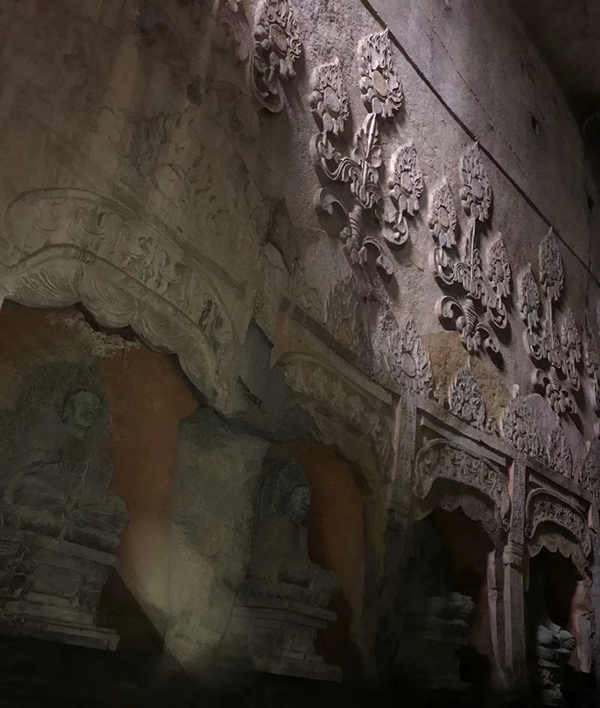
Writing is the contemplation of language.
I've been figuring out how to write it. Since the 1980s, I have been regarded as an avant-garde poet, with mixed reviews. A pioneer is a pioneer in how to write. Back to the text, this is my last ten years of exploration. Perhaps a bit postmodern, as opposed to the "futurist avant-garde" towards the so-called progressive, future (Baudelaire defined progress as "the thinning of the soul and the gradual takeover of the material"). My direction is backwards. The type of writing since the May Fourth Movement (novels, poems, prose, etc. with a clear distinction between Jingwei and Wei), in fact, they have never been different. For example, Wang Zengqi, Shen Congwen, Joyce, Proust... Their works are novels It’s still prose, it’s been vague and inconsequential, it’s actually just writing.) Step back and return to writing, a kind of holistic writing.
The Paper: The first part of the book talks about Alan Ginsburg, Kerouac and Bukowski, and it's easy to think that maybe this is a work influenced by "On the Road"? "On the Road" was written by Kerouac on a 30-meter roll of typewriter paper in one breath, without much careful consideration, almost as if pouring out and releasing the passion for writing. In "Somewhere on the Mississippi", you jump back and forth between the present you see and the fragments you remember, and the whole book gurgles like a small river, with no fixed theme, no introduction, title, chapter, why Choose such a way to write a book?
Yu Jian: I read Ginsberg's poems in the 1980s and "On the Road" in the early 1990s, which I remember as an underground print. The writing of the "Beat Generation", in my opinion, is nothing more than two words: freedom. You can write whatever you want, the important thing is to make the reader feel and think about it.
Going back to the text is going back to a kind of freewheeling in writing. Of course, it's not that I don't understand. Instead, it is in a trance, and there is an elephant in it.
The Paper: "Somewhere on the Mississippi" seems to be a very "speed" writing, especially when entering the description of Manhattan, the Empire State Building, Times Square, the eternal glass curtain wall and flowing neon lights, it seems that there is no need to stop Thinking and deep reflection, I wonder if your use of this kind of flowing writing, which often returns to reality and memory, is also a kind of writing that fits the times?
Yu Jian: Poets are always aware of the way of writing in their own time. Although the way of writing remains unchanged, today’s writers still have to write in the style of the authors of the Book of Songs (such as Xingguan Qunqi, Yuanyuan, and Duozhi), But this Dao (without learning poetry, there is nothing to say. Confucius) can only be awakened in his own time, and what the times enlightens to the author is the way of writing, not the times. In this era, the great demolition has left the traditional Chinese living world in ruins. What Marx called alienation, Marcuse called the era of strangers, globalization has arrived, everything that has been accomplished is falling apart, and all values are being reassessed. A new world Has risen and prospered. But there are also countless fragments left. It was these fragments that made me realize the possibility of the resurrection of Wen. Wen is all-encompassing, and everything can be understood as fragments.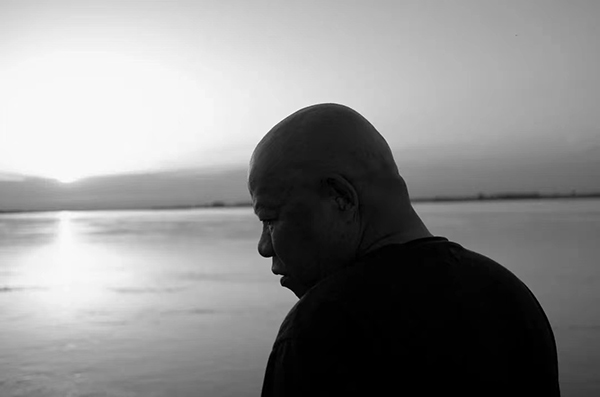
The Paper: "Somewhere in the Mississippi River" wrote, "When I was a child, I used to go to a monastery built in the Yuan Dynasty at the foot of Yuantong Mountain in Kunming to play. The vermilion monastery was built on the cliff, and on the cliff there was a karst cave from the flood and famine era. It has been sealed with wooden boards for many years, and every time we go, we have to peep into the wooden boards. My cousin said that we can reach the United States by going through this dark cave."
Regarding the architecture of Manhattan, you wrote that the traditional Chinese dwelling concept requires any building to cling to the earth, while the American spirit is upward, and everything can be designed out of thin air. Even today, the Chinese still like the land, the landscape, However, I am still afraid of all the buildings that are too tall (such as the discussions caused by the China Zun of Guomao), which is so different from everything in the United States, and the two cultures are seriously colliding.
The "meeting" of the two experiences, in addition to the above-mentioned sense of grafting of some urban legends or the different texture and graininess of the two brought about by different histories, does it make you feel that there is a fusion at certain moments?
Yu Jian: What I want to write about is something universal, something basic. Since the 20th century, "living elsewhere" and "on the road" have become common excuses and actions for people to escape Dasein. Others are heaven, others are hell. For the East, the West (America and the like) becomes a different place, more so-and-so, higher. Even for some authors, a judge of the highest value. When hometown and mother tongue become backward, Dasein must be abandoned. "Go to the place where the ancients live" (Qu Yuan) has become a world trend.
Marx once predicted: "The bourgeoisie destroys all feudal, patriarchal and idyllic relations where it has ruled. It leaves no connection between man and man but naked interests, but ruthless 'cash transactions.' It drowns the sacred epiphany of religious piety, chivalrous zeal, burgher sentimentality in In the icy waters of self-interested designs. It turns human dignity into exchange value, and replaces countless privileged and self-earned liberties with a conscientious freedom of trade. In short, it uses open, shameless, Direct, blatant exploitation replaces exploitation veiled by religious and political fantasies. The bourgeoisie has erased the sacred aura of all professions that have always been revered and revered. It has brought doctors, lawyers, priests, poets and scholars It becomes a wage laborer that it pays to hire.”
Benjamin later called it "the age of the fading light." Emmanuel (its other name is Poetic) knows no borders. I found that the aura of this era was fragmented, but not gone. Aura is not ethereal, it is the details.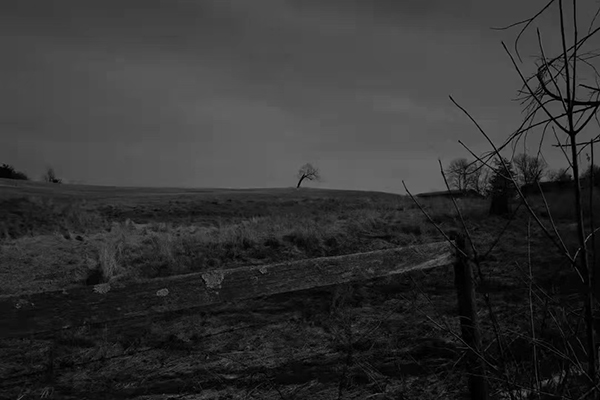
Su Shi said, "This place of peace of mind is my hometown." I want to tell the reader something reassuring to live in the ruins, to record the details that survive. Maybe it evokes memories and contemplation. My ambition is that it might be possible to rebuild the aura. Those pieces are not only solid, they are deeper and more exciting than the whole. It's really exciting when you find a shard of memories in a small town far from home.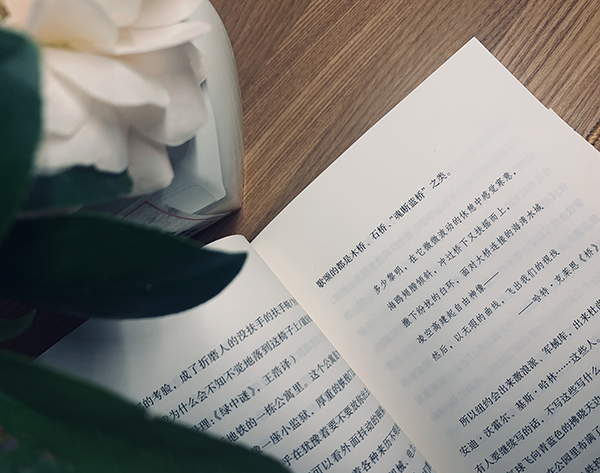
The Paper: You repeatedly salvage memories of the United States in your books, such as the jazz radio you surreptitiously listened to, the Beat Generation, and Whitman's "Leaves of Grass" that made you "flesh and soul out of your body" , For example, did the imagination of the United States during the "going abroad fever" create a too positive and ideal United States?
Yu Jian: Those are some of the realities I have experienced, which may seem ideal to readers, but this idealization is based on a Chinese context. "Life" is a derogatory term in China in the twentieth century. It is another name for living, mediocre. What I'm actually writing is my surprise and emotion at the mediocre details of American life I've encountered. Surprised that these details evoke memories of my hometown, not an "elsewhere". You can live this way without having to be "somewhere on the Mississippi."
What impresses me most about America is a cult of life. Life is the only one. Everything (economics, politics, ideology, art, technology, business...) is for life, life is supreme. Wang Yangming regards "lively and splashing the ground" as "just like other rivers and waters. If it is interrupted for a moment, it is not similar to heaven and earth."
The Paper: But rather than the old, ancient details of life in the United States, the United States appears more as an overall image full of freshness and hope, like the one presented in "Lolita", like Rimbaud and Balzac Humbert is the epitome of the old world in Europe, while Lolita, chewing gum and drinking Coke, is the representative of the living American spirit, and the former is dumped by the latter is also a political metaphor. There are countless such "miniatures of American impressions" scattered in novels and film and television works. What do you think of these American impressions? Will this be overturned when you actually arrive in America again and again?
Yu Jian: In the era of economic take-off in the United States, even in the era of McKinsey, the most important and best-selling publication was Life magazine, which talked about food, clothing and entertainment. In China in the second half of the twentieth century, life was the object of revolution. When I was a teenager, women would be caught parading the streets for just perming their hair, and I had never seen a lady with lipstick and earrings on. The deepest impression the United States gave me was that I came to an old-fashioned world of life, rather than a world of ever-changing concepts (today, the pursuit of fashion in China has completely obscured life. Life is unknown because of its simplicity, and all kinds of fashions that are popular) . Whether Humbert or Lolita, they are life, mediocre or a little bit of a philistine, and they are all over the world. The only difference is that in some languages, they are never mentioned.
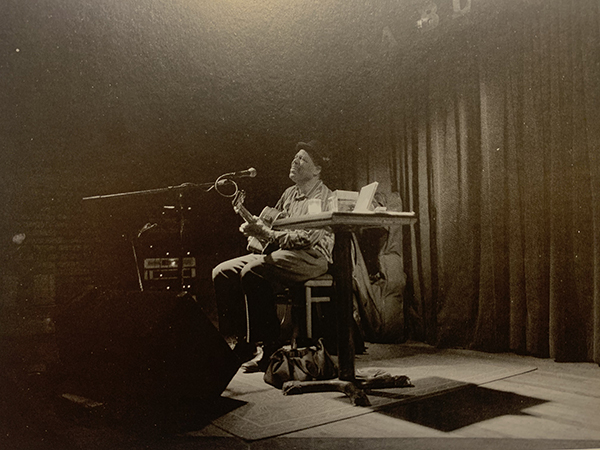
Yu Jian : It's all design, but the world view behind the design is different. Chinese design lacks respect for Chinese tradition and the living world, and blindly imitates, unconventional, pretentious, and self-expression. Not from life, but from ideas. To be tall and to be tall. Being tall is not a home, it's just a symbol. I once asked a designer if your eighty-year-old mother could walk on such a wide road, before the red light came on? He was speechless. He obeys ideas, symbols, metaphors rather than concrete people. Any design should be suitable for life, rather than a metaphor for a certain value and meaning. But what is life? Face or lining? It's a worldview question.
The worldview of classical China is "If you hurt people, don't ask about horses". Many modern designs are rather hurtful. For example, the glass curtain walls of the metropolis are splendid, majestic, tall, beautiful and imposing, but they are quite hurtful. Why are there so many useless paintings and carved beams in ancient courtyard houses to support people? New York's design is quite commercial, but people are considered in the details. Manhattan is a place to walk. There are many retail kiosks, free sellers, newsstands, coffee shops, homeless people, hippies, tourists... Some places look dirty, Manhattan is not just a hospital-like shopping mall .
Back to people, back to life, back to details. Back to "Old people are old, and people are old; young people are young, and people are young. The world can be transported in the palm of your hand." "Mencius, King Hui of Liang". Going back to the traditional Chinese "Dao and natural", simple, "beautiful and perfect". Not just "adventures of ideas" (Whitehead). How to buy vegetables, how to retire... WeChat payment, a popular method in China, is quite advanced, convenient and hygienic, but not benevolent. Many old mothers and fathers have been abandoned. Only talk about technological progress, ignore the complexity of people, and eliminate details. Confucius said: It is beautiful and perfect. Beauty comes first, technology is good (correct), but not beautiful. An unbeautiful life is like an animal.
The world as a material rather than a meaning
The Paper : It seems to be a problem that all travel journals (for the time being, this simple definition) will face - the scenery that has been beautified by literature and art and tampered with imagination can't help but be disappointed when you actually see it. Is the same for your experience in the United States? ? Or does the real landscape make the senses richer or poorer?
Yu Jian: In America, I deeply feel the honesty of writers like Whitman, Dickinson, Frost or Steinbeck, Eugene O'Neill, and this is their life, eternal life. They are not exaggerated writers, they do not falsify or exaggerate life. I read a lot of American literature underground in my youth, when America was a taboo. When I actually got to America, the attitude to life implied by those works came back to life, and my feeling was that this was America. This is not some kind of alien world. I met so many friends that I met at first sight, furniture that I knew, like some kind of organ that can trigger memories, and America made me feel nostalgic.
I read Whitman's "Leaves of Grass" on the Yunnan Plateau, and I am familiar with the innocence, simplicity, health, recklessness, and romanticism. The ethnic groups in Yunnan are very similar to the Indians.
The Paper : This question can also be applied to the photo book published with the book. Can you talk about the photos in it? What do you want the photos inside to show the reader?
Yu Jian: An image is a relic of time. It gives the viewer some kind of proof - the illusion that they're all fragments, and you can't capture the gust of wind that's going over the picture. What matters is how I see the world. There is always a living tradition behind the fragments, and this tradition is omnipresent. The images document the phenomena of a time and place that suggest a living tradition. I like that kind of subconscious photo, I don't know what I want to take, what is the meaning, I just feel the light, the composition, the details are beautiful and eye-catching. See what, this will have a long-term aesthetic accumulation. I always see something, like a glimpse of a plaque on an old wall. I prefer the view of Proust and Woolf, which is more like a present memory. A memory triggered by a detail, when the shutter is pressed, time freezes. The world to me is an antique full of pulp, you have to respect it.
Chinese readers may be used to some kind of salon photography, beautiful, glowing, curious... WOW! I photograph the world as a material rather than meaning.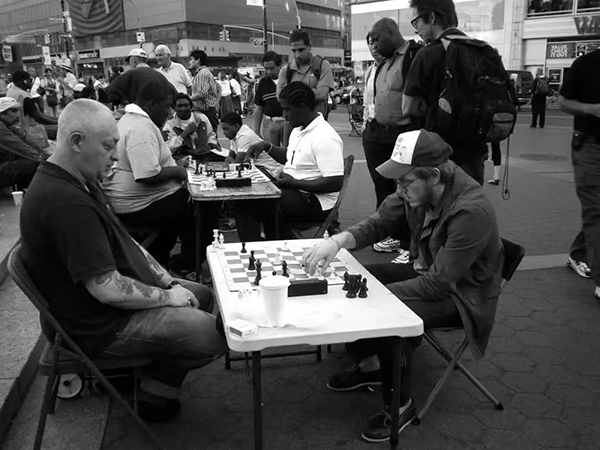
Yu Jian: For writers, "the American dream is shattered" is not a disaster, but a theme. In America, there are many poets and writers who write about backwardness, cynicism, negativity, mockery of the superior, and consistently correct. Self-critical, the American Dream is a joke to them. The Beat Generation is about to break down from the American Dream and return to life. Life is alive, not just living, life is the right way. They write that life is not the American dream. This kind of writing is the same as Du Fu, Bai Juyi, Su Shi, and Cao Xueqin. "A Dream of Red Mansions" is not a dream, but Cao Xueqin once lived like this. So are "Reminiscences of the Past" and "Ulysses."
The Paper: These works actually have a certain distance in time and space from contemporary times. In your book, you also believe that American culture, which is strongly dependent on this material culture and consumer culture, “all kinds of creativity are discarded after use.” The past is always in ruins, only the future continues to stretch." The new urban rhythm has spawned a certain kind of art and artists who pay attention to and perform "fast decay", such as Andy Warhol, such as Keith Haring, you think, How should literature respond to this culture? Either in terms of subject matter or subject matter?
Yu Jian: Beneath the contemporary era, there is something that cannot be destroyed by the era, that is, life. Eat, drink, sleep, live, feel at ease, and never change. All revolutions are about starting life again, aren't they? Without life, people fall into the darkness of material control, what Marx calls alienation. Zhuangzi said: Things are things but things are not things. Materialism is the life of animals.
"Quick rot" is actually a worldview and a style. That's why Andy Warhol, Keith Haring are still not out of date. Their pursuit of fast decay is actually a bit Zen, and they are the affirmations of the life world. Coca-Cola is not art in the eyes of traditional art (such as the Louvre), Andy Warhol affirmed it, this is life in our time. Life is art, painting is life, and so is the movie star Monroe. Before the Tang and Song Dynasties, no one would think that Taihu Stone was an art until it was moved into gardens. Life is art. This used to be an ancient truth in the Chinese world, but it has only been obscured in modern times.
Immortality is a worldview, and Confucius advocates this worldview. Fast rot is also a worldview, and Zhuangzi advocates this worldview.
Contemporary American literature is still relatively serious, classical and somewhat conservative, and the avant-garde has become conservative. It's not opportunistic, what's popular and what's written. Lao Tzu is still expressing the so-called "Tao can be Tao, very Tao". I have a great respect for American literature. Frost, Gary Snyder, and Stevens remind me of Wang Wei and Su Shi. Needless to say, Pound got inspiration from the worldview of old China.
Is Wang Wei outdated? will never! There is no such land that Wang Wei has recorded—“the bright moon shines among the pine trees, and the clear springs and stones flow up”, the kind of world—“the lover Yule rides a horse, and the maid Jinpan carries carp. Hearts and green willows hang down the eaves. Luo Wei sends Qixiang chariot, Baofan welcomes you back to Jiuhua tent.” The life is not worth living. The Song Dynasty was perhaps the most developed era of life in the world, and perhaps less developed politically. Siheyuan, painted buildings and carved beams have sprung up in China, because people have generally realized that an unbeautiful life has no dignity and is not worth living.
It's easy to live, and animals do. Life requires art, wisdom, knowledge. That's why Confucius said, "If you don't learn poetry, you can't speak." Hölderlin and Heidegger said: "Man is full of achievements, but he dwells poetically on the earth." To be speechless is to not exist.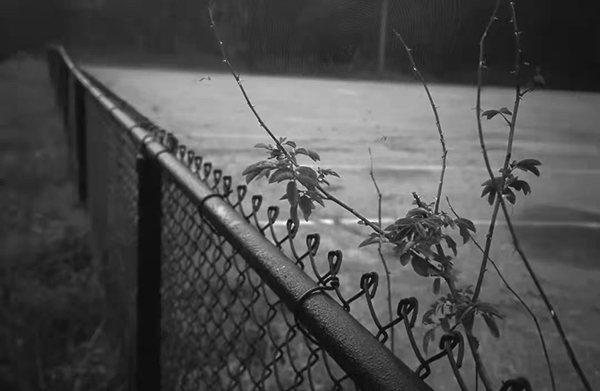
As the title suggests, this is a "scenario writing" about the passage of the Mississippi River. Yu Jian writes about the natural scenery, the endless storm-like trees on the banks of the Mississippi River, and the dim, like a The river of Indian faces, the emotions and feelings experienced personally somewhere in the Mississipa will always hook up a distant memory, or a kind of poetry, and flow freely through various time and space, like babbling. Text across various genres.
At the same time, Yu Jian pays more attention to the civilization watered and grown by the river that makes the United States become the United States. The author believes that "many designs in the United States were originally local designs, but eventually became a universal design." How should we understand The American culture that finally prevailed in the world? What is it like in the context in which it is produced? From American fever to the shattering of the American dream, how should the narrative of America proceed?
Yu Jian wrote: "Rembrandt is definitely a lonely outdated old monster in New York. Coca-Cola is full of poetry, cars are full of poetry, computers are full of poetry, toilets are full of poetry, skyscrapers are full of poetry, glass, cement, steel are full of poetry, capital, The white cuffs of technology and business giants with their badges are full of poetry. Poetry is no longer the set of Whitman and Dickinson, not the starry sky, wilderness, blades of grass, forest, sunset, fireflies, moonlight... you You have to live here, on this artificial earth, to live a moist country. Accept your fate, this is your paradise, paradise is not in the afterlife, but in New York." In "Somewhere in the Mississippi River", Yu Jian wrote with a kind of presence and sincerity It leaves words and images for the United States at the moment, and at the same time reflects on the United States in the textual sense.
Regarding the writing of "Somewhere in the Mississippi", Yu Jian responded: "This book started about ten years ago, I completed the first part, and I have been looking for a direction since then. Intermittently, sometimes writing a poem, sometimes writing a paragraph Memories, sometimes a reflection, a note. I don’t want readers to think this is just another American travelogue—it’s a trendy subject. I was inspired by Kafka’s America, which was really just a kind of Kafka's 'American mood' collection of words has nothing to do with America, and he has never been to America."
Recently, The Paper interviewed Yu Jian.

book shadow
Back to the text, a holistic writingThe Paper: How do you define the book "Somewhere in the Mississippi"? It looks like a travel journal, and also like a "picture description" of photographic works, and there are also many comments on poets and painters scattered in it?
Yu Jian: This book may be called a "phenomenological" writing. Phenomenon, "that which manifests itself in itself" (Heidegger) My writing for the last ten years has been returning to "wen". The text is not classified, the text is to write everything. For example, Zuozhuan, it is difficult to say that it is a historical narrative, short story, prose, essay or poem. The same is true of ancient Chinese paintings, which not only have images, but also words (calligraphy, poetry). The text is a kind of overall writing, and there are many things. I was once shocked by a rock niche in the Xiangtangshan Grottoes in Hebei. In one area, there are not only Buddha statues and sculptures of landscapes, but also characters, seals, weathering marks, water stains, etc., forming a magnificent picture. In an article, essays, essays, novels, branch poems, reviews, images... are just the stylistic details in it.
Articles use the visible text (language) to reveal the invisible way, and use the text to cover up. I thought this was the foundation of writing, the necessity of writing. Writing this word in Chinese is not stylized. Writing is writing everything. Write and store things. "Shuowen Jiezi" to create, to create, to also. The style of "Erya · Interpretation" is only the material structure of the text, and the article is the combination and placement of word materials under a certain theme (not the theme or meaning). This is the same as the writing of Chinese characters. The horizontal and vertical strokes are only materials and components. The characters written by the author are the works, which will never be the same, and each hand is different. Writing is not about writing, it is writing. Writing is not a tool for reaching meaning, writing itself is the placement, removal, and phenomenon of life.

Xiangtangshan Grottoes
It's hard to say what the significance of Cezanne's paintings is, that is, something that looks like an apple, so beautiful! A real apple pales in comparison to this fake apple. The same is true of "Somewhere on the Mississippi", I have a hard time saying what it was writing, all I can say is that it was a field of words that I wrote called "Somewhere on the Mississippi." I am relieved that reader reviews of this book are often fascinated by my language.Writing is the contemplation of language.
I've been figuring out how to write it. Since the 1980s, I have been regarded as an avant-garde poet, with mixed reviews. A pioneer is a pioneer in how to write. Back to the text, this is my last ten years of exploration. Perhaps a bit postmodern, as opposed to the "futurist avant-garde" towards the so-called progressive, future (Baudelaire defined progress as "the thinning of the soul and the gradual takeover of the material"). My direction is backwards. The type of writing since the May Fourth Movement (novels, poems, prose, etc. with a clear distinction between Jingwei and Wei), in fact, they have never been different. For example, Wang Zengqi, Shen Congwen, Joyce, Proust... Their works are novels It’s still prose, it’s been vague and inconsequential, it’s actually just writing.) Step back and return to writing, a kind of holistic writing.
The Paper: The first part of the book talks about Alan Ginsburg, Kerouac and Bukowski, and it's easy to think that maybe this is a work influenced by "On the Road"? "On the Road" was written by Kerouac on a 30-meter roll of typewriter paper in one breath, without much careful consideration, almost as if pouring out and releasing the passion for writing. In "Somewhere on the Mississippi", you jump back and forth between the present you see and the fragments you remember, and the whole book gurgles like a small river, with no fixed theme, no introduction, title, chapter, why Choose such a way to write a book?
Yu Jian: I read Ginsberg's poems in the 1980s and "On the Road" in the early 1990s, which I remember as an underground print. The writing of the "Beat Generation", in my opinion, is nothing more than two words: freedom. You can write whatever you want, the important thing is to make the reader feel and think about it.
Going back to the text is going back to a kind of freewheeling in writing. Of course, it's not that I don't understand. Instead, it is in a trance, and there is an elephant in it.
The Paper: "Somewhere on the Mississippi" seems to be a very "speed" writing, especially when entering the description of Manhattan, the Empire State Building, Times Square, the eternal glass curtain wall and flowing neon lights, it seems that there is no need to stop Thinking and deep reflection, I wonder if your use of this kind of flowing writing, which often returns to reality and memory, is also a kind of writing that fits the times?
Yu Jian: Poets are always aware of the way of writing in their own time. Although the way of writing remains unchanged, today’s writers still have to write in the style of the authors of the Book of Songs (such as Xingguan Qunqi, Yuanyuan, and Duozhi), But this Dao (without learning poetry, there is nothing to say. Confucius) can only be awakened in his own time, and what the times enlightens to the author is the way of writing, not the times. In this era, the great demolition has left the traditional Chinese living world in ruins. What Marx called alienation, Marcuse called the era of strangers, globalization has arrived, everything that has been accomplished is falling apart, and all values are being reassessed. A new world Has risen and prospered. But there are also countless fragments left. It was these fragments that made me realize the possibility of the resurrection of Wen. Wen is all-encompassing, and everything can be understood as fragments.

Yu Jian
Aura is not ethereal, it is the detailsThe Paper: "Somewhere in the Mississippi River" wrote, "When I was a child, I used to go to a monastery built in the Yuan Dynasty at the foot of Yuantong Mountain in Kunming to play. The vermilion monastery was built on the cliff, and on the cliff there was a karst cave from the flood and famine era. It has been sealed with wooden boards for many years, and every time we go, we have to peep into the wooden boards. My cousin said that we can reach the United States by going through this dark cave."
Regarding the architecture of Manhattan, you wrote that the traditional Chinese dwelling concept requires any building to cling to the earth, while the American spirit is upward, and everything can be designed out of thin air. Even today, the Chinese still like the land, the landscape, However, I am still afraid of all the buildings that are too tall (such as the discussions caused by the China Zun of Guomao), which is so different from everything in the United States, and the two cultures are seriously colliding.
The "meeting" of the two experiences, in addition to the above-mentioned sense of grafting of some urban legends or the different texture and graininess of the two brought about by different histories, does it make you feel that there is a fusion at certain moments?
Yu Jian: What I want to write about is something universal, something basic. Since the 20th century, "living elsewhere" and "on the road" have become common excuses and actions for people to escape Dasein. Others are heaven, others are hell. For the East, the West (America and the like) becomes a different place, more so-and-so, higher. Even for some authors, a judge of the highest value. When hometown and mother tongue become backward, Dasein must be abandoned. "Go to the place where the ancients live" (Qu Yuan) has become a world trend.
Marx once predicted: "The bourgeoisie destroys all feudal, patriarchal and idyllic relations where it has ruled. It leaves no connection between man and man but naked interests, but ruthless 'cash transactions.' It drowns the sacred epiphany of religious piety, chivalrous zeal, burgher sentimentality in In the icy waters of self-interested designs. It turns human dignity into exchange value, and replaces countless privileged and self-earned liberties with a conscientious freedom of trade. In short, it uses open, shameless, Direct, blatant exploitation replaces exploitation veiled by religious and political fantasies. The bourgeoisie has erased the sacred aura of all professions that have always been revered and revered. It has brought doctors, lawyers, priests, poets and scholars It becomes a wage laborer that it pays to hire.”
Benjamin later called it "the age of the fading light." Emmanuel (its other name is Poetic) knows no borders. I found that the aura of this era was fragmented, but not gone. Aura is not ethereal, it is the details.

Yu Jian Photography
What I want to say is that life is not elsewhere, such as the popular slogan "There is still poetry and distance". Life is life, and it has nowhere else but in language. The judge of the highest value is nowhere else but in the mother tongue (the mother tongue is the swamp of aura). One does not find a more so-and-so life in a foreign land, where there are no details, the details are the products of time. The material of life is the same for everyone, if you can't find life and find inspiration in your hometown (the place of the "details of heaven and earth"), you can find it anywhere in the world not. Hometown has provided the most basic experiential details of life and living world, mother, woman, man, child, salt, neighbors, well, a eucalyptus tree... It's just how you relate to them, how you live. There is no life that is not worth living, only how to live it, even Auschwitz. I read a story about a female prisoner who was transported to Poland in a stuffy tank car and saw a scarf-shaped cloud in the gap of the train. She kept thinking about this cloud for several years, and finally she came out alive. Rimbaud, who once said "living elsewhere", used to go all over the world to find other places. He and Baudelaire were both tired of the life in Paris before the "industrialization", but the various adventures on the road finally only made Lanbo. Wave disappointed. "I die of exhaustion." "Going to the place of eternity" only makes people lose their aura more completely. Qu Yuan's despair was not the loss of the official position of Doctor Sanlu, but "to go to the place where the ancients lived", "to leave the capital of Ying and go to Luxi, it will be extremely desolate". Aura no longer. "The soul of the Qiang wants to return, why should it be forgotten for a moment?" Qu Yuan's anxiety is actually a common human condition. Nowadays, "the place where the ancients live", the large-scale disappearance of aura has become the trend of the century, the homogenized new world has developed technology, and things rule everything. Fetishism prevailed. Details are the enemy of homogeneity.Su Shi said, "This place of peace of mind is my hometown." I want to tell the reader something reassuring to live in the ruins, to record the details that survive. Maybe it evokes memories and contemplation. My ambition is that it might be possible to rebuild the aura. Those pieces are not only solid, they are deeper and more exciting than the whole. It's really exciting when you find a shard of memories in a small town far from home.

inside pages
a worship of lifeThe Paper: You repeatedly salvage memories of the United States in your books, such as the jazz radio you surreptitiously listened to, the Beat Generation, and Whitman's "Leaves of Grass" that made you "flesh and soul out of your body" , For example, did the imagination of the United States during the "going abroad fever" create a too positive and ideal United States?
Yu Jian: Those are some of the realities I have experienced, which may seem ideal to readers, but this idealization is based on a Chinese context. "Life" is a derogatory term in China in the twentieth century. It is another name for living, mediocre. What I'm actually writing is my surprise and emotion at the mediocre details of American life I've encountered. Surprised that these details evoke memories of my hometown, not an "elsewhere". You can live this way without having to be "somewhere on the Mississippi."
What impresses me most about America is a cult of life. Life is the only one. Everything (economics, politics, ideology, art, technology, business...) is for life, life is supreme. Wang Yangming regards "lively and splashing the ground" as "just like other rivers and waters. If it is interrupted for a moment, it is not similar to heaven and earth."
The Paper: But rather than the old, ancient details of life in the United States, the United States appears more as an overall image full of freshness and hope, like the one presented in "Lolita", like Rimbaud and Balzac Humbert is the epitome of the old world in Europe, while Lolita, chewing gum and drinking Coke, is the representative of the living American spirit, and the former is dumped by the latter is also a political metaphor. There are countless such "miniatures of American impressions" scattered in novels and film and television works. What do you think of these American impressions? Will this be overturned when you actually arrive in America again and again?
Yu Jian: In the era of economic take-off in the United States, even in the era of McKinsey, the most important and best-selling publication was Life magazine, which talked about food, clothing and entertainment. In China in the second half of the twentieth century, life was the object of revolution. When I was a teenager, women would be caught parading the streets for just perming their hair, and I had never seen a lady with lipstick and earrings on. The deepest impression the United States gave me was that I came to an old-fashioned world of life, rather than a world of ever-changing concepts (today, the pursuit of fashion in China has completely obscured life. Life is unknown because of its simplicity, and all kinds of fashions that are popular) . Whether Humbert or Lolita, they are life, mediocre or a little bit of a philistine, and they are all over the world. The only difference is that in some languages, they are never mentioned.

"Lolita" stills
For me, the United States is not a "the other side", the other side that some people talk about with relish (in fact, most Chinese travel notes about the West in recent decades have this other side worship plot), it's just a life. There is no essential difference between this kind of life and basic life, only the difference in the tradition and form of life. For example, they do not have the poetic architecture of the courtyard with carved beams, birds and flowers, rockeries and rocks, but they also care about the natural connection between life and the earth rather than abandoning the earth.
Yu Jian Photography "A Blues Bar in Brooklyn"
The Paper: You also mentioned that whether it is a skyscraper or an airport, it was originally a local design in the United States, but eventually it became a universal design. When we accept them, we accept their discipline and design for our way of life. , brighter and brighter lights have replaced sunlight, and working hours can be extended indefinitely; office buildings are folded, and all designs seem to aggravate alienation. Today, many urban diseases appear, such as excessive dependence on material culture, consumption Is culture, excess desire and the resulting infinite emptiness, involution, and ineffective self-consumption all to blame for these over-the-top designs? And when you go to the United States, where consumer culture and this "design life" civilization have been developed to the extreme, can you find a solution to these stubborn diseases brought about by modernity?Yu Jian : It's all design, but the world view behind the design is different. Chinese design lacks respect for Chinese tradition and the living world, and blindly imitates, unconventional, pretentious, and self-expression. Not from life, but from ideas. To be tall and to be tall. Being tall is not a home, it's just a symbol. I once asked a designer if your eighty-year-old mother could walk on such a wide road, before the red light came on? He was speechless. He obeys ideas, symbols, metaphors rather than concrete people. Any design should be suitable for life, rather than a metaphor for a certain value and meaning. But what is life? Face or lining? It's a worldview question.
The worldview of classical China is "If you hurt people, don't ask about horses". Many modern designs are rather hurtful. For example, the glass curtain walls of the metropolis are splendid, majestic, tall, beautiful and imposing, but they are quite hurtful. Why are there so many useless paintings and carved beams in ancient courtyard houses to support people? New York's design is quite commercial, but people are considered in the details. Manhattan is a place to walk. There are many retail kiosks, free sellers, newsstands, coffee shops, homeless people, hippies, tourists... Some places look dirty, Manhattan is not just a hospital-like shopping mall .
Back to people, back to life, back to details. Back to "Old people are old, and people are old; young people are young, and people are young. The world can be transported in the palm of your hand." "Mencius, King Hui of Liang". Going back to the traditional Chinese "Dao and natural", simple, "beautiful and perfect". Not just "adventures of ideas" (Whitehead). How to buy vegetables, how to retire... WeChat payment, a popular method in China, is quite advanced, convenient and hygienic, but not benevolent. Many old mothers and fathers have been abandoned. Only talk about technological progress, ignore the complexity of people, and eliminate details. Confucius said: It is beautiful and perfect. Beauty comes first, technology is good (correct), but not beautiful. An unbeautiful life is like an animal.
The world as a material rather than a meaning
The Paper : It seems to be a problem that all travel journals (for the time being, this simple definition) will face - the scenery that has been beautified by literature and art and tampered with imagination can't help but be disappointed when you actually see it. Is the same for your experience in the United States? ? Or does the real landscape make the senses richer or poorer?
Yu Jian: In America, I deeply feel the honesty of writers like Whitman, Dickinson, Frost or Steinbeck, Eugene O'Neill, and this is their life, eternal life. They are not exaggerated writers, they do not falsify or exaggerate life. I read a lot of American literature underground in my youth, when America was a taboo. When I actually got to America, the attitude to life implied by those works came back to life, and my feeling was that this was America. This is not some kind of alien world. I met so many friends that I met at first sight, furniture that I knew, like some kind of organ that can trigger memories, and America made me feel nostalgic.
I read Whitman's "Leaves of Grass" on the Yunnan Plateau, and I am familiar with the innocence, simplicity, health, recklessness, and romanticism. The ethnic groups in Yunnan are very similar to the Indians.
The Paper : This question can also be applied to the photo book published with the book. Can you talk about the photos in it? What do you want the photos inside to show the reader?
Yu Jian: An image is a relic of time. It gives the viewer some kind of proof - the illusion that they're all fragments, and you can't capture the gust of wind that's going over the picture. What matters is how I see the world. There is always a living tradition behind the fragments, and this tradition is omnipresent. The images document the phenomena of a time and place that suggest a living tradition. I like that kind of subconscious photo, I don't know what I want to take, what is the meaning, I just feel the light, the composition, the details are beautiful and eye-catching. See what, this will have a long-term aesthetic accumulation. I always see something, like a glimpse of a plaque on an old wall. I prefer the view of Proust and Woolf, which is more like a present memory. A memory triggered by a detail, when the shutter is pressed, time freezes. The world to me is an antique full of pulp, you have to respect it.
Chinese readers may be used to some kind of salon photography, beautiful, glowing, curious... WOW! I photograph the world as a material rather than meaning.

Yu Jian Photography
The Paper: In recent years, many narratives about "the sinking of the United States" and "the shattering of the American dream", such as the novel "The Great Gatsby" and the non-fiction "The Sinking Age", are very popular in China. But in fact, it will also cause a certain degree of misunderstanding. For example, behind The Great Gatsby, there is Fitzgerald's reflection on the American frontier movement. The novel has its historical background, and these may not be able to reach Chinese readers well. You How do you view the translation, introduction and attention of these works?Yu Jian: For writers, "the American dream is shattered" is not a disaster, but a theme. In America, there are many poets and writers who write about backwardness, cynicism, negativity, mockery of the superior, and consistently correct. Self-critical, the American Dream is a joke to them. The Beat Generation is about to break down from the American Dream and return to life. Life is alive, not just living, life is the right way. They write that life is not the American dream. This kind of writing is the same as Du Fu, Bai Juyi, Su Shi, and Cao Xueqin. "A Dream of Red Mansions" is not a dream, but Cao Xueqin once lived like this. So are "Reminiscences of the Past" and "Ulysses."
The Paper: These works actually have a certain distance in time and space from contemporary times. In your book, you also believe that American culture, which is strongly dependent on this material culture and consumer culture, “all kinds of creativity are discarded after use.” The past is always in ruins, only the future continues to stretch." The new urban rhythm has spawned a certain kind of art and artists who pay attention to and perform "fast decay", such as Andy Warhol, such as Keith Haring, you think, How should literature respond to this culture? Either in terms of subject matter or subject matter?
Yu Jian: Beneath the contemporary era, there is something that cannot be destroyed by the era, that is, life. Eat, drink, sleep, live, feel at ease, and never change. All revolutions are about starting life again, aren't they? Without life, people fall into the darkness of material control, what Marx calls alienation. Zhuangzi said: Things are things but things are not things. Materialism is the life of animals.
"Quick rot" is actually a worldview and a style. That's why Andy Warhol, Keith Haring are still not out of date. Their pursuit of fast decay is actually a bit Zen, and they are the affirmations of the life world. Coca-Cola is not art in the eyes of traditional art (such as the Louvre), Andy Warhol affirmed it, this is life in our time. Life is art, painting is life, and so is the movie star Monroe. Before the Tang and Song Dynasties, no one would think that Taihu Stone was an art until it was moved into gardens. Life is art. This used to be an ancient truth in the Chinese world, but it has only been obscured in modern times.
Immortality is a worldview, and Confucius advocates this worldview. Fast rot is also a worldview, and Zhuangzi advocates this worldview.
Contemporary American literature is still relatively serious, classical and somewhat conservative, and the avant-garde has become conservative. It's not opportunistic, what's popular and what's written. Lao Tzu is still expressing the so-called "Tao can be Tao, very Tao". I have a great respect for American literature. Frost, Gary Snyder, and Stevens remind me of Wang Wei and Su Shi. Needless to say, Pound got inspiration from the worldview of old China.
Is Wang Wei outdated? will never! There is no such land that Wang Wei has recorded—“the bright moon shines among the pine trees, and the clear springs and stones flow up”, the kind of world—“the lover Yule rides a horse, and the maid Jinpan carries carp. Hearts and green willows hang down the eaves. Luo Wei sends Qixiang chariot, Baofan welcomes you back to Jiuhua tent.” The life is not worth living. The Song Dynasty was perhaps the most developed era of life in the world, and perhaps less developed politically. Siheyuan, painted buildings and carved beams have sprung up in China, because people have generally realized that an unbeautiful life has no dignity and is not worth living.
It's easy to live, and animals do. Life requires art, wisdom, knowledge. That's why Confucius said, "If you don't learn poetry, you can't speak." Hölderlin and Heidegger said: "Man is full of achievements, but he dwells poetically on the earth." To be speechless is to not exist.

Yu Jian Photography
Related Posts